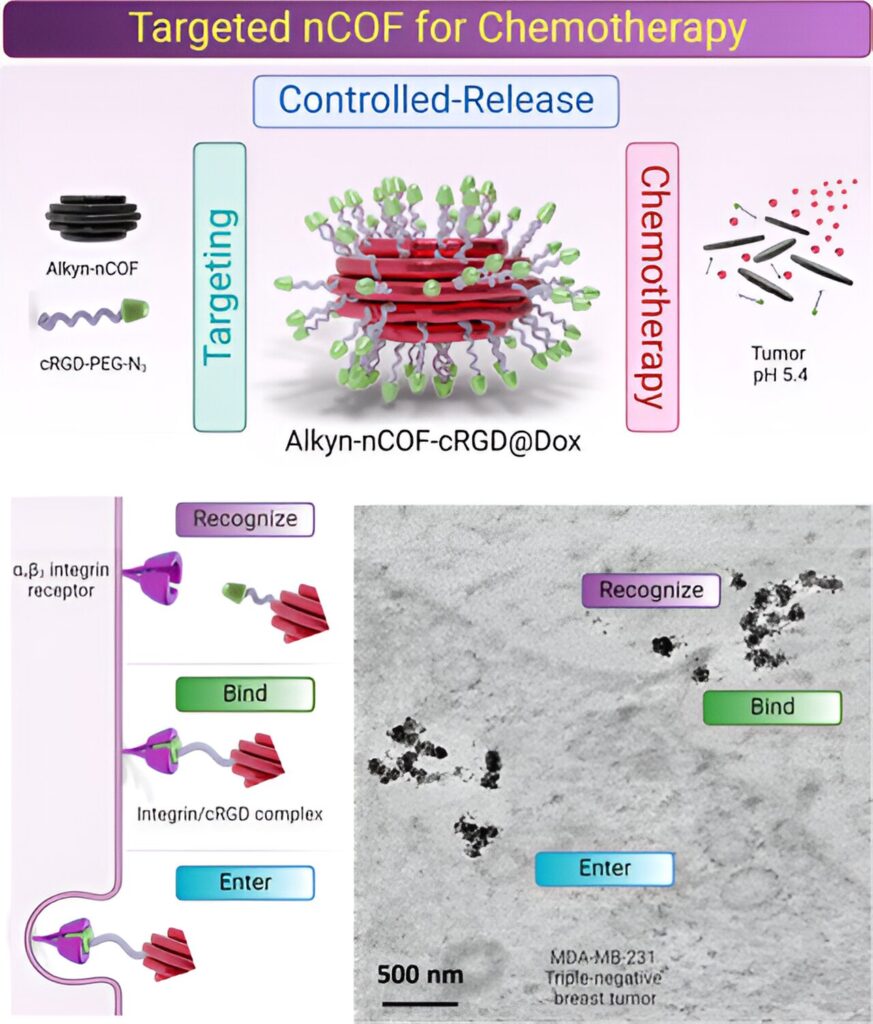A team of researchers at NYU Abu Dhabi (NYUAD), led by Program Head of Chemistry Ali Trabolsi, have developed nanoscale covalent organic frameworks (nCOFs), crystalline organic polymers that have been modified with peptides to treat the most aggressive form of breast cancer, known as triple-negative breast cancer (TNBC).
The peptides enable the COFs to release drug cargo within the acidic environment of the tumor, ensuring that high concentrations of the drug are delivered directly to the tumor site. This increases the effectiveness of the treatment while minimizing the impact on healthy tissues.
This novel treatment delivery method offers hope for a new approach for treating triple-negative breast cancer, which tends to grow and spread faster than other forms of breast cancer. It has fewer treatment options and typically has a worse prognosis.
While peptides have previously been used for targeted delivery, their conjugation with COFs represents an innovative approach in this field. In the paper titled “cRGD-Peptide Modified Covalent Organic Frameworks for Precision Chemotherapy in Triple-Negative Breast Cancer” published in the journal ACS Applied Materials & Interfaces, the researchers describe the process of designing alkyne-functionalized nCOFs that have been chemically modified with cyclic RGD peptides (Alkyn-nCOF-cRGD).
This configuration was designed to specifically target αvβ3 integrins, which are overexpressed in TNBC cells. The nCOFs are biocompatible and were engineered to selectively disintegrate under acidic conditions, allowing for the precise and localized release of Doxorubicin, a chemotherapeutic agent that has been encapsulated in the nCOFs.
Farah Benyettou, a key researcher on the team, said, “Our innovative approach using peptide-conjugated COFs offers a highly targeted treatment method for triple-negative breast cancer. By focusing on the acidic environment of tumors, we can deliver chemotherapy precisely where it is needed most, reducing side effects and improving patient outcomes. The peptides act like a key to open the door of cancer cells, allowing the drug to enter and exert its effects exactly where it is needed.”
This research is particularly significant in the UAE, where breast cancer rates are notably high. Existing drug delivery systems often have significant drawbacks, such as non-specific distribution, fluctuations in drug plasma levels, rapid clearance, and side effects on healthy tissue. The successful in vitro and in vivo results of this study not only highlight the advanced targeting capabilities of the nCOFs but also set new standards for personalized cancer therapy.
“Our research has created a smarter way to fight the most aggressive and invasive form of breast cancer,” said Trabolsi.
“By providing a targeted approach to cancer therapy, this technology not only fills existing gaps in drug delivery research but also represents a crucial step towards personalized medicine in cancer treatment that is both more effective and less harmful to patients,” said Benyettou.


